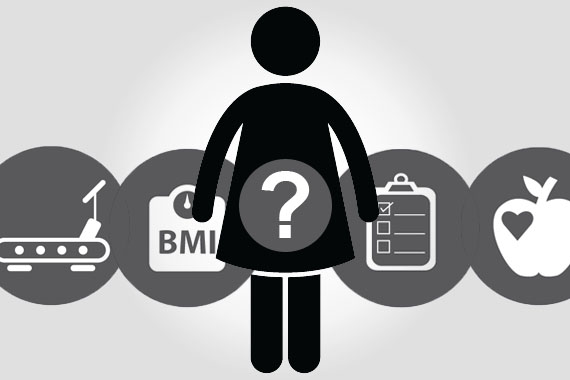“Are you pregnant?”
It’s a topic employers generally avoid, since the Pregnancy Discrimination Act of 1978 prohibited sex discrimination on the basis of pregnancy. But women’s advocates fear these long-standing protections could be undermined by some workplace wellness programs.
That question and “How old were you when you first became pregnant?” are both included in a health risk assessment offered to some clients of Audax Health, a wellness firm. Similar queries are posed in health risk assessments offered by other wellness programs, say consumer groups, including the National Women’s Law Center.
“These are questions they should not ask,” because of the potential for discrimination, said Emily Martin, vice president and senior counsel for the NWLC, in a letter to the Obama administration asking for a ban on such questions in wellness programs.
Their concerns – submitted to the Equal Employment Opportunity Commission — come amid growing scrutiny of wellness programs and controversial new rules proposed by the EEOC this spring that more broadly define what employers must do to ensure that wellness programs are voluntary. Debate has largely centered on the level of financial incentives allowed — the EEOC says up to 30 percent of the annual cost of an employee’s health insurance is OK — but anxieties have also been raised about how much leeway the programs should have in making medical inquiries.
Pregnancy questions included in many wellness programs hit a nerve, drawing not only the law center’s response, but also similar comments from more than 2,400 of its supporters, submitted in a single package to the EEOC.
Many cite fears that wellness program information about pregnancy status will get back to employers – although several laws and rules sharply limit what employers can glean. Advocates say that employers may still be able to get that information, either directly or indirectly, and some could use it against employees.
“There are still lots of stereotypes out there, that pregnant women and mothers aren’t as competent, as committed to their work or as good as other employees,” said Martin. “Because of that long history of discrimination against women when they’re pregnant … we are concerned about employers asking and workers feeling compelled to answer [these] questions.”
Wellness programs vary widely, ranging from simple discounts on gym memberships to elaborate programs aimed at uncovering health risks, such as high blood pressure, elevated cholesterol, stress or depression. Most employers offer some form of workplace wellness, hoping the programs will hold down health costs by getting workers to take steps to improve their well-being.
The EEOC’s proposed rules define what those programs must do to meet the requirements of the Americans with Disabilities Act (ADA), a law aimed at preventing discrimination. The ADA generally prohibits employers from asking health- or disability-related questions, except in limited circumstances, such as through voluntary workplace wellness programs.
The EEOC proposed rule does not bar questions about pregnancy, although the commission warns employers that wellness programs must be voluntary, “reasonably designed” to improve health and not a “subterfuge for violating the ADA or other laws prohibiting employment discrimination.” No timetable has been set for finalizing the regulation.
Asking Questions, Gathering Data
Employers and the wellness vendors they hire to run them say this personal information is rarely – if ever – shared with the employer, adding that participation is voluntary and answers to questions are used to help tailor the programs, both for the individual and the corporate group as a whole. Most employers do use some type of third-party vendor to gather answer from health risk assessments.
Vendors generally share with employers only pooled results that have been stripped of personal identifiers, such as names. The EEOC proposal cements that stance, saying wellness programs can only share aggregated data – not personally identifiable information — with employers, unless individual data is needed to administer the employer’s health plan.
“Audax includes a question about pregnancy in its Zensey health risk assessment so that pregnant women can be connected to pre-natal care and resources, if they want them,” said David Sclar, chief privacy officer at Audax, which is part of Optum, owned by UnitedHealth Group. One Zensey form, prepared for client Cigna, asks about current pregnancy status and the age when a woman first got pregnant.
“Employers receive only aggregate-level data, not individual responses, to help them develop and tailor their employee health and wellness programs over time,” said Sclar at Audax.
Still, critics fear that even aggregated data highlighting pregnancy status could be used to identify specific workers, especially if it were given to a small company or if there were only a few women participating in the wellness program.
“Aggregating data for 10,000 workers is very different than for 250, said Dania Palanker, senior counsel at the women’s law center. “The smaller the employer, the easier it might be to learn things.”
Questions about pregnancy are not allowed in other employment contexts, such as hiring, said Carol Merchasin, a former employment lawyer who runs her own consulting and training firm outside of Boston.
Including them in workplace wellness questionnaires blurs the line – and harkens back to an earlier era before the 1978 law added pregnancy to a list of protected classes covered by Title VII of the Civil Rights Act, she said.
“I don’t want to go back to time when we asked those questions,” said Merchasin.
“We are in a political climate where pregnancy and birth control and all these things are politicized. I’m sure all of these wellness programs have good intentions, but there are unintended consequences.”
A Particularly Touchy Subject
Representatives from wellness firms Humana Vitality, LiveHealthier and Bravo Wellness all confirmed that their assessments include such questions.
At Vitality, spokesman Jeff Blunt said finding out if a participant is pregnant helps assure that any health goals the program helps set for the worker are appropriate for someone who is expecting and allows them to suggest participating in the HumanaBeginnings maternity program. That program includes phone calls from specially trained nurses at least once during each trimester.
Despite the vendors’ focus on developing tailored plans, pregnancy questions – perhaps unlike inquiries about blood pressure or cholesterol – are a particularly touchy subject.
“It’s none of their business,” said Teresa Anderson, who was among the law center supporters who wrote the EEOC in opposition to the questions, although her employer in Austin, Texas, does not have a wellness program.
Some women keep their pregnancy status private for as long as possible, fearing they could be fired or will lose out on a promotion or raise, advocates say.
While Title VII of the Civil Rights Act prevents employers from firing or taking disciplinary action against a woman because she is pregnant, that hasn’t ended such discrimination, said Palanker at the women’s law center.
Last year, the EEOC, which oversees most pregnancy discrimination charges, handled 3,400 cases, finding no cause in 60 percent of the cases, but moving forward on many of the others.
“Just because a law says an employer can’t do something, doesn’t mean some employers won’t,” Palanker said.







